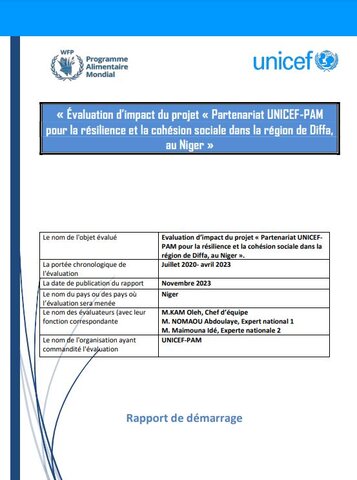
This decentralized evaluation was jointly commissioned by WFP Niger and UNICEF Niger and covers the UNICEF and WFP partnership for resilience and social cohesion in the region of Diffa, in Niger from July 2020 to April 2023. It was carried out between January 2022 to July 2024.
The evaluation was commissioned to provide evidence on the effects of the programme in terms of strengthening resilience (individual, community, systemic) and social cohesion and was intended for both accountability and learning purposes. The evaluation covered the following activities: local capacities strengthening, resilience building, community involvement and strengthening social cohesion.
Key evaluation findings:
- Relevance: The programme responds to the needs of the local population.
- Impact: The programme has helped to improve access to education.
- Sustainability: The programme has helped to build the capacity of systems at national, regional and local level.
- Learning: Local institutions supported the programme by participating in the identification of needs and the implementation of activities. The programme is integrated into social and cultural structures.
- Human rights, equity and gender: The principles of gender, human rights and equity were integrated into the design and implementation of the programme. Gender was considered through community consultations. The needs of specific groups were identified and addressed programme. The capacities of women and young people have been strengthened.
Key recommendations from the evaluation included:
- Recommendation 1: Build the capacity of decentralised authorities in resource mobilisation techniques to finance community development plans.
- Recommendation 2: Coordinate the entry points for the targeting before project implementation within the ‘BMZ Diffa coordination framework’.
- Recommendation 3: Build the capacity of decentralised authorities in resource mobilisation techniques to finance community development plans.
- Recommendation 4: Support the integration of community development plans into future municipal development and investment plans.
- Recommendation 5: Put in place an organisational framework to operationalise the E-commune platforms so that investments can be exploited, and local authorities have an endogenous decision-making tool.
- Recommendation 6: Continue to finalise the capacity assessment of companies in Niger to build WASH infrastructure.
- Recommendation 7: Support regional public institutions (technical services and municipalities) to systematically consider the nexus approach in their intervention plans and programmes.
